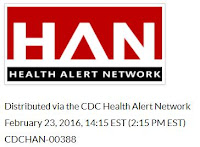# 11,052
As mentioned earlier today (see CDC : Sexual Transmission Of Zika May Be More Common Than Previously Believed), the CDC is investigating 14 possible cases of sexual transmission of the Zika virus and this afternoon has issued the following HAN Advisory.
Update: Interim Guidelines for Prevention of Sexual Transmission of Zika Virus — United States, 2016
Distributed via the CDC Health Alert NetworkSummary: The Centers for Disease Control and Prevention (CDC) recently published recommendations for protecting people against sexual transmission of Zika virus (1). As stated in that report, information about possible sexual transmission of Zika virus was based on one published report of transmission from a man to a woman, one published report in which Zika virus was detected in semen of a man with hematospermia, and one case of possible sexual transmission then under investigation in Texas. An additional case of Zika virus detected in semen in a man was reported after the CDC recommendations were published (2).
February 23, 2016, 14:15 EST (2:15 PM EST)
CDCHAN-00388
As of February 23, 2016, CDC and state public health departments are investigating 14 additional reports of possible sexual transmission of the virus, including several involving pregnant women. While additional investigations are being completed, CDC is issuing this HAN Advisory as a strong reminder to state, local, and US territorial public health departments, clinicians, and the public to be aware of and adhere to current recommendations for preventing sexual transmission of Zika virus, particularly for men with pregnant partners. These recommendations may change as more information becomes available.
(BIG SNIP)
Recommendations for men and their pregnant partners
Men who reside in or have traveled to an area of active Zika virus transmission who have a pregnant partner should abstain from sexual activity or consistently and correctly use condoms during sex (i.e., vaginal intercourse, anal intercourse, or fellatio) for the duration of the pregnancy. Pregnant women should discuss their male partner’s potential exposures to mosquitoes and history of Zika-like illness (http://www.cdc.gov/zika/symptoms) with their health care provider; providers can consult CDC’s guidelines for evaluation and testing of pregnant women (6).
Recommendations for men and their nonpregnant sex partners
Men who reside in or have traveled to an area of active Zika virus transmission who are concerned about sexual transmission of Zika virus might consider abstaining from sexual activity or using condoms consistently and correctly during sex. Couples considering this personal decision should take several factors into account. Most infections are asymptomatic, and when illness does occur, it is usually mild with symptoms lasting from several days to a week; severe disease requiring hospitalization is uncommon. The risk for acquiring vector-borne Zika virus in areas of active transmission depends on the duration and extent of exposure to infected mosquitoes and the steps taken to prevent mosquito bites (http://www.cdc.gov/zika/prevention). After infection, Zika virus might persist in semen when it is no longer detectable in blood; studies to determine the duration of persistence in semen are not yet completed.
Accumulating evidence of sexual transmission suggests that exposure to Zika virus includes unprotected sexual contact with a symptomatic male partner who resides in or has traveled to an area of active Zika virus transmission.
Zika virus testing is currently recommended to establish a diagnosis of infection in exposed persons with signs or symptoms consistent with Zika virus disease, and may be offered to asymptomatic pregnant women with possible exposure to Zika virus (6). However, interpretation of results is complex, and health care providers should contact their state, local, or territorial health department for assistance with arranging testing and interpreting results. At this time, testing of exposed, asymptomatic men for the purpose of assessing risk for sexual transmission is not recommended. Sexual transmission of Zika virus from infected women to their sex partners has not been documented, nor has transmission from persons who are asymptomatically infected. Sexual transmission of many infections, including those caused by other viruses, is reduced by consistent and correct use of latex condoms.
As we learn more about the incidence and duration of seminal shedding from infected men and the utility and availability of testing in this context, recommendations to prevent sexual transmission of Zika virus will be updated.
(Continue . . .)
HAN messages (Alert, Advisory, Update, or Info) are designed to ensure that communities, agencies, health care professionals, and the general public are able to receive timely information on important public health issues.
An `Advisory’ is a second tier message that Provides important information for a specific incident or situation, but may not require immediate action.
